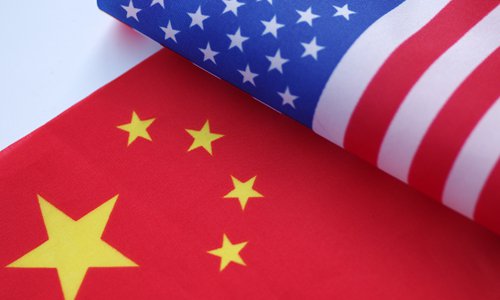HOME >> OPINION
US aggression will not only hit bilateral ties, but damage global stability
By Zhu Feng Source:Global Times Published: 2019/7/24 20:23:40

Photo: VCG
The change in the nature of China-US relations has upset the world. At a time when globalization as well as open and free business and social interactions have become the basic guarantee of global stability, peace and prosperity, hawks within the Trump administration treat China as a scapegoat for US domestic political and social rifts.
They attempt to stifle China on trade and technology with the intent of leaving it behind in the high-tech and development race. In order to achieve this goal, some US political elites have been spouting anti-China propositions. An open letter signed by 130 hawkish veterans as well as those from the far-right urging the Trump administration to stay on course in its path of taking on China is a vivid example.
China has always been a controversial subject in US politics. This is not only because of its importance in US national security strategy but also because of the long-lasting ideological clash.
More importantly, identity politics has long existed in the US. It implies that a considerable number of US people choose values and interpret policies based on their own understanding of happiness, freedom and rights while enjoying the freedom and equal rights guaranteed by the Constitution. Today's US still trumpets universal values, but what it has actually done reflects populism, nationalism and even racism.
Against the backdrop, hawks have been unscrupulously promoting their anti-China philosophy, not only in US government departments, but also in the country's media, confusing right and wrong, and calling China the enemy of freedom.
The open letter to Trump shows their extreme proposition. The people who signed the letter have earlier shown a hostile attitude toward Beijing.
Gordon G Chang, one of the signatories of the letter, used to be a lawyer and had once worked in Shanghai. His book, The Coming Collapse of China, published in 2001, alarmingly said that China will quickly disintegrate. Yet China's booming development all these years has made his book a laughing stock. But he won't let go of his belief and won't stop hyping up his "China collapse theory."
But we should not underestimate these anti-China hawks' opinions. Fanatics like Chang will not change their ideas and beliefs and are still prominent in US media, news and even policymaking circles. Michael Pillsbury, writer of The Hundred-Year Marathon: China's Secret Strategy to Replace America as the Global Superpower, used to be popular in the Trump administration's China policy circle. As for Chang, he frequently wrote anti-China articles in Forbes and The National Interest. The signatories of the letter also include young US experts on China, and some have even entered the US policymaking circle.
A strong stance against China is a dangerous signal of US diplomacy. The letter manifests a Cold War mentality. It wants the US to again regard the socialist country as an enemy, and gives suggestions to Trump, proposing strengthening of "alliances with like-minded democracies" to defeat China. If such fanatic propositions are realized, US hegemony will be the biggest destroyer of the international order.
If current US policy toward China advocates returning to the ideological dichotomy and anti-communist hysteria of neo-McCarthyism, which has echoes of the Cold War, it will not only ruin the 40 years of friendly interactions between Beijing and Washington, but also have a disastrous impact on global stability and prosperity.
The tough journey of China's reform and opening-up for 41 years provides the world "Beijing consensus" on the diverse options for development. If the US policy on China heads back to the old anti-Communist rhetoric, it will not only be a great retreat of the times, but also a relapse of the nightmare that Washington's hegemonic interests re-dominate China-US ties and global politics.
The author is the executive director of the China Center for Collaborative Studies of the South China Sea at Nanjing University. opinion@globaltimes.com.cn
Posted in: VIEWPOINT